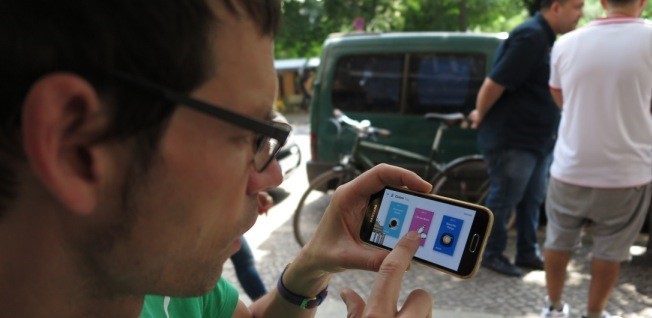How I Learn German — 7 (+1) Tips from a Slow Learner
I’ve lived in Munich for eight years now and learning German has become part of my life. I’ve just finished reading my third book in the language and it seems like a good time to take stock and look back at all the things I have done / still do to learn the language.
I’m far from talented as a linguist, but I’ve given up self-admonishment about the slowness of my progress. Instead, I now focus on the process of learning rather than over-worrying about results. When people ask me if I’m fluent, I’m not sure what the answer is (I think it’s a “no”). What I am sure of is that I’ve reached the point where I can enjoy the learning process and make it part of my daily life, without complaint.
Here are some of the things I do, or have done to learn German:

Reading on the train.
1. Reading
I’ve always loved reading and I love reading in German, too. The great challenge as a foreign language learner is to find the texts and books that you can understand and enjoy.
Deutsch Perfekt is a monthly publication that grades its articles by leicht (easy), mittel (medium), and schwer (difficult), and which contains good general interest topics. There are also some great “easy-learners” out there that are written for an adult audience. There’s a whole series of Krimis (crime novels) published by Cornelsen for levels A1 to B1 which are really pretty funny. Best of all, was the B1 easy-reader version of the German classic Effi Briest. Such a powerful story, I actually shed a tear. One day, I will read it in the original version — but it won’t be tomorrow.
2. Movies and Television
I still find it hard to get a lot out of watching the television. I know some people who say this has really helped them, but for me TV is such a relaxant, my mind just shuts off. Putting the subtitles on does help but it’s still a struggle to stay concentrated. I would advise learners — especially early learners — not to expect too much from their TVs.
Going to the movies or watching TV series with friends is better as it forces you to concentrate, but you do need to choose what you watch with care. Often the worst movies are the best ones to see in German. The hammier the plot, the easier it is to understand!
3. Apps
There are so many to choose from and I’ve tried most of them. Rosetta Stone has been great for my pronunciation. It gets you to read out and repeat words via a Karaoke-style screen. Each syllable lights up as you have to pronounce it. This is learning gold. I have to concentrate on every part of the word, not just scan it, and I find it really helps with memorising the vocabulary, too.
Memrise is my other favourite. It’s an uber-gamified flash card app that is pretty clever at making learning fun. The problem with flashcards is that they are only as good as what you put in them. So recently I’ve switched to Anki because it’s easier to download my own cards (from my Kindle) and control the frequency of repetitions.

Using the Rosetta Stone app.
4. Language Exchange Dates
Finding a really good tandem partner (person who you do a language exchange with) is not easy. It’s really important that you are at a similar level, otherwise insecurity, boredom, and resentment are never far away. What’s more, even if you are speaking at about the same level, you have to find something to talk about.
I’ve only ever had one really good tandem partner. We met every week for nearly two years. We had similar language skills, a lot in common, and never got bored, but we were also very disciplined, sticking to an hour or so in each language, a cup of herbal tea, and an early tram home.
5. Private Tuition.
I’ve read about people finding “language parents”, someone you feel unembarrassed in front of and who is infinitely patient. My language parent was a personal tutor, a young linguistics student who came to my office every week for a year and taught me in my lunch break. At the early stage of learning I was at, I think this process was really crucial. I basically didn’t have any understanding of what grammar was (in any language) until she tirelessly drummed the basics into me. I think she only lost her temper with me twice that year, for which she deserves a medal.
Much more recently I’ve also tried learning with an online tutor, which is a very cost-effective way of getting one-on-one tuition.
6. German-Speaking Clubs
I also go to German-speaking get-togethers. InterNations hosts a couple of them in Munich and they are usually well-attended, sometimes by German natives as well. Of course, your experience depends entirely on who you manage to get talking to. Nonetheless, I pretty much always get something from these meets when I go.

Puzzled by German articles.
7. Classes
Again, I’ve taken a lot of them! In the end there is a great deal of luck involved in going to language class. Who your teacher is and who your classmates are makes a huge difference.
I think my biggest advances came when I attended intensive courses. Courses that had me learning, speaking, and thinking about German every day. Best of all was a seven-week intensive course with the Goethe institute. This was about two years into my time in Munich and just after my time with the personal tutor, so I already had a lot of familiarity, and this course just accelerated my progress. The B1 syllabus taught me all the important grammatical rules in a way I could actually understand and use. I felt my mind actively expanding in those weeks and feel that this was the moment I really started to “get it”.
Bonus Tip: Take Every Opportunity to Learn
In the end, learning German in Germany should be about talking to people, but you might be surprised how infrequently this happens if you don’t make it happen. There are very few Germans I meet in Munich whose English is as bad as my German, and they usually seem a lot keener to hear my British accent than my German one…
So I have to actively seek out opportunities to speak German. I sometimes deliberately choose procedural interactions with people just to practice the language: going to the kiosk and chatting to the sales assistant rather than buying my train ticket at the machine. Conversations that might be boring otherwise, are totally worthwhile when you’re learning the language.
Overall, my relationship with the German language has been a fraught one. I could and probably should have approached it very differently. Nonetheless, I have persevered, tried lots of different learning activities, and got to a point now where I almost feel proud of myself. Just once in a while these days a German who meets me for the first time tells me they think my German is really good, and I half-believe they’re being sincere.
How do you learn best? Share your own tips and experiences with us via guide@internations.org for a chance to win a 6-month language course with Rosetta Stone — the language learning software that comes with live tuition. For more information, take a look at the Terms & Conditions.











